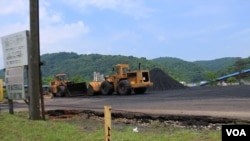In early June, Tammy Mondrage lost her job as a registered nurse at Ridgeview High School in southwestern Virginia when the county school board eliminated more than 40 positions for budget reasons.
Mondrage, in her late 40s, was the major wage earner in her family of four, and the news came as a blow. But she was not really surprised.
“The budget cuts came because of the loss of the coal industry. In the county, it hit the school system too. And that hit me too,” said Mondrage at her home in the hamlet of Steinman which was named after the Steinman Brothers, who operated a coal mine in the area about a century back.
Thanks to the coal industry, area residents had mostly remained immune to budget shortfalls or unemployment.
But things started getting tough a year ago when Tammy’s husband David lost his job at Paramont Coal Company.
King coal
Coal has been a vital component of the U.S. economy since the late 19th century and a major source of energy. In the Appalachian region, people like Mondrage's family have been dependent on the coal industry for their livelihood for generations.
However, due to tighter regulations on carbon emissions, lower oil prices and growing demand for cleaner energy, coal production has declined in the last few years. According to the U.S. Energy Information Administration (EIA), coal production in the country fell 10 percent between 2014 and 2015 alone.
That has hurt coal-dependent communities, many of which, like Steinman, are in the Appalachian Mountain region.
"For the last 100 years or so many of these communities have had one source of employment, one source of income," said Earl Gohl, federal co-chair of the Appalachian Regional Commission (ARC). "And as coal has moved away and declined dramatically, now it’s important to take the next step and to work with counties to make this transition."
Local communities across Appalachia have started, though reluctantly, thinking about diversifying the local economy. With the help of government partners, some counties in Virginia are now undertaking projects to attract tourists and adventure seekers.
Retooling
Nestled in the green mountains, the small town of Cleveland in Russel County, Virginia, used to have four grocery stores, banks, a hotel and train station in the middle of the last century.
But Cleveland’s population has shrunk to about a quarter of what it was in the 1950s. None of those businesses remain, and the town’s mayor says all the schools have closed due to the lack of funds.
"We had a high school that closed," said David Sutherland. "Then the middle school closed. And the last one we had was the elementary school which closed three years ago. So, at this time, we have no school."
But what Cleveland does have that no downturn in the coal industry can touch is scenic mountain trails and the Clinch River, which runs through town. The local community, along with local and state partners, is implementing an action plan to develop tourism in the area. And recently, an entrepreneur opened a rental store for kayaking and rafting enthusiasts near the city’s Town Hall.
The nearby town of Haysi has been improving its infrastructure with the hopes of attracting visitors and businesses.
“We have done a lot of improvements to the building facades,” said Mayor Larry Yates. “We have done new windows and doors and a lot of new paint, new lighting, new signage – those type of things to the buildings. Then we have also done extensive work to our sidewalks.”
In Tazewell County, Spearhead Trails is developing and promoting a 37-mile trail for All-Terrain Vehicles (ATVs) near a mine site for adventure seekers.
Creating new jobs
Regional efforts are also underway to educate local youth in fields never before considered because life in the region revolved around “black gold” (coal).
“When I was growing up everybody was a coal miner’s kid,” Tammy Mondrage said. “You know that is what this county was. That is what this community was. That is what everybody knew. It was big.”
At the peak of the coal era, 15- 16-year-old boys would often find a job in a coalmine and did not feel the need to pursue college education.
Tammy’s 24-year-old son Zachary Mondrage did the same. However, after losing his job at Paramont Coal Company, where his father worked, he is now studying to launch a new career in adventure and tourism.
“The reason why I decided to get into this is because I have always been an outdoor enthusiast as far as hunting, fishing and just being outdoors and enjoying it,” he said. “And I thought that would be a great career opportunity to get into.”
Although economic activity is picking up in coal country, it is difficult for some to fathom that like tobacco, the coal industry may soon become history. Moreover, it may take several generations to change the region’s economy.
Tammy may not have the time, patience, or resources to wait. But Zachary may have more options when efforts to diversify the economy start showing results.









